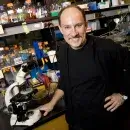
Joseph Heitman
Joseph Heitman, MD, PhD is James B. Duke Professor, Chair of the Department of Molecular Genetics and Microbiology, Duke University School of Medicine, Director of the Tri-Institutional Molecular Mycology and Pathogenesis Training Program, and Co-Director and Fellow of the CIFAR program Fungal Kingdom: Threats & Opportunities.
Pioneering research with yeast discovered TOR and FKBP12 as the targets of the immunosuppressive and antiproliferative drug rapamycin, now widely used in organ transplantation and cancer chemotherapy; later work elucidated key features of how the TOR signaling pathway senses nutrients to control cell responses. Elucidated nutrient sensing signaling cascades governing yeast morphological differentiation. Subsequent research focused on pathogenic fungi, developing molecular, genetic, and genomic approaches to understand how they evolve and cause human infections, and identifying therapeutic targets for antimicrobial drug development. Studies illuminated evolution and function of mating-type loci, illustrating parallels with sex chromosome evolution of plants and animals. Discovered a novel unisexual reproductive mode that impacts eukaryotic microbial pathogen evolution, emergence, and infectivity, with implications on the origins of sexual reproduction. Characterized fungal disease outbreaks afflicting immunocompetent and immunocompromised patients, molecularly tracking isolates and analyzing virulence and genomes with insights for origins and pathogen emergence. Explicated sex-induced RNAi pathways preserving genome stability, RNAi loss and hypermutators in outbreak pathogens, and RNAi-evoked epimutations conferring drug resistance in human fungal pathogens. Advanced studies of Malassezia and dermatophyte fungi to understand how these ubiquitous fungal inhabitants colonize and infect the skin of humans and other animals globally. Collaborative studies forged fungal genomics resources illuminating fungal karyotype and centromere evolution.
Dedicated editor or board member for multiple journals; co-editor of seven textbooks on microbiology, genetics, and microbial pathogenesis, including most recently The Fungal Kingdom, ASM Press, 2018; 20+ continuous years teaching at the Woods Hole/MBL Molecular Mycology course; past administrative service as director of the Duke University Program in Genetics and Genomics graduate training program (2002-2009).
Dr. Heitman received a B.S. in chemistry with general and special honors, and M.S. in Biochemistry, University of Chicago, 1984; Ph.D. in biomedical sciences, Rockefeller University, 1989; M.D., Cornell University, 1992. He was an EMBO post-doctoral fellow at the Biozentrum, University of Basel, Switzerland, 1989 to 1991. He joined the faculty at Duke University in 1992 and was an Investigator of the Howard Hughes Medical Institute 1992 to 2005 and a Burroughs Wellcome Scholar 1998 to 2005. His research has been recognized with a series of awards, including the Gustavo Cudkowicz Memorial Immunobiology Prize (1991), ASBMB/AMGEN Award (2002), Squibb Award, Infectious Diseases Society of America, (2003); NIH/NIAID MERIT Award for research on unisexual reproduction and impact on human fungal pathogens ﴾2011-2021﴿; Stanley J. Korsmeyer Award, American Society for Clinical Investigation, for key contributions to understanding how microbial pathogens evolve, cause disease, and develop drug resistance and discovery of TOR and FKBP12 as targets of rapamycin ﴾2018﴿; Rhoda Benham Award, Medical Mycological Society of the Americas, ﴾2018﴿; Edward Novitski Prize, Genetics Society of America, honoring work on human fungal pathogens and identifying molecular targets of widely-used immunosuppressive drugs, a seminal contribution to discovery of TOR, which regulates cell growth in response to nutrients (2019); ASM Award for Basic Research, American Society for Microbiology (2019). He is an elected fellow or member of the: American Society for Clinical Investigation (2003); Infectious Diseases Society of America (2003); American Academy of Microbiology ﴾2004﴿; American Association for the Advancement of Science ﴾2004﴿; Association of American Physicians ﴾2006﴿; American Academy of Arts and Sciences (2020); National Academy of Sciences (2021).